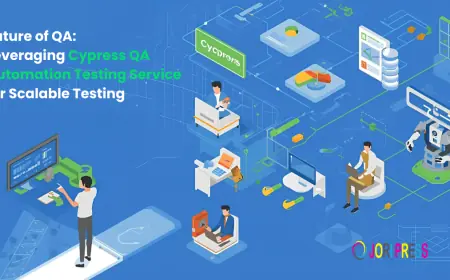How Quality Management Software Improves Agent Performance and CX
Learn how quality management software helps contact centers boost agent performance, ensure compliance, and deliver a consistent customer experience.

In today's hyper-competitive landscape, customer experience (CX) has emerged as the primary differentiator for businesses across all sectors. At the heart of this experience lies the contact center, where every interaction can either solidify customer loyalty or drive it away. Yet, ensuring consistent, high-quality service across thousands, or even millions, of customer interactions is a monumental challenge for even the most sophisticated organizations. This is where contact center quality management software steps in, transforming what was once a largely manual, subjective, and reactive process into a data-driven, proactive, and highly effective strategy.
Far beyond mere call recording, modern Quality Management Software (QMS) is an indispensable tool that fundamentally reshapes how contact centers operate. By providing unparalleled insights into agent performance, identifying compliance risks, and uncovering systemic issues, QMS not only elevates the efficiency and effectiveness of individual agents but also dramatically improves the overall customer experience.
The Evolution of Quality Management: From Checklists to AI-Driven Insights
For decades, quality assurance in contact centers relied heavily on manual processes. Supervisors would listen to a small, statistically insignificant sample of calls, score them against a checklist, and then provide feedback. This approach was inherently limited: it was time-consuming, prone to individual bias, lacked scalability, and offered only a fragmented view of agent performance and customer sentiment.
The digital revolution ushered in the first wave of contact center QMS, automating recording and basic scoring. However, the true transformation began with the integration of artificial intelligence and machine learning. Today's advanced AI QMS solutions leverage sophisticated algorithms to analyze every interaction – not just voice calls, but also chats, emails, and social media messages – providing a comprehensive, objective, and actionable understanding of contact center dynamics.
Core Components and Transformative Benefits of Modern QMS
A robust QMS solution offers a suite of functionalities designed to optimize every facet of contact center operations.
1. Automated Monitoring, Evaluation, and Scoring
One of the most significant breakthroughs of modern QMS is the ability to move beyond sampling. Leveraging AI QMS capabilities, the software can analyze 100% of interactions. This involves:
-
Speech Analytics: Transcribing calls, identifying keywords, phrases, and sentiment (positive, negative, neutral). This allows for automated detection of everything from expressions of frustration to instances of cross-selling or compliance adherence.
-
Text Analytics: Applying similar analysis to chat transcripts, emails, and social media conversations.
-
Automated Scoring: Instead of a supervisor manually scoring an interaction, the AI can score interactions against predefined quality rubrics, identifying specific areas where an agent excelled or struggled. This provides objective, consistent, and immediate feedback.
The benefit here is profound: a complete, unbiased picture of performance that eliminates human error and vastly expands the scope of quality assurance.
2. Targeted Agent Coaching and Training
The ultimate goal of quality management is not just to identify problems, but to fix them. QMS excels in this by enabling highly targeted and effective coaching:
-
Pinpointing Skill Gaps: AI-driven analysis identifies recurring issues for specific agents (e.g., struggling with empathy, missing compliance statements, taking too long on certain requests).
-
Personalized Feedback Loops: Supervisors receive alerts and detailed reports on agent performance, complete with links to specific moments in interactions that highlight areas for improvement. This allows for hyper-focused coaching sessions.
-
Automated Training Pathways: Some advanced systems can even recommend or assign self-paced e-learning modules or micro-training sessions based on identified skill deficiencies, empowering agents to improve autonomously.
This shift from generic group training to personalized, data-driven coaching significantly accelerates agent development, reduces ramp-up time for new hires, and ensures continuous improvement across the team.
3. Enhanced Compliance and Risk Mitigation
In many industries, particularly finance, healthcare, and telecommunications, adherence to regulatory standards is non-negotiable. Breaches can lead to significant fines, legal ramifications, and reputational damage. This is where call center compliance auditing becomes critical, and QMS plays an invaluable role:
-
Automated Detection of Compliance Breaches: QMS can be configured to automatically flag phrases, omissions, or agent behaviors that violate regulatory requirements (e.g., failure to read a disclosure, inappropriate sharing of information).
-
Comprehensive Audit Trails: Every interaction, along with its analysis and compliance score, is meticulously logged and easily retrievable, providing an irrefutable audit trail for regulatory bodies.
-
Proactive Risk Management: By identifying common compliance pitfalls across the entire agent pool, organizations can proactively update training, refine scripts, or adjust processes to mitigate future risks before they escalate.
This capability provides a vital layer of protection, transforming compliance from a reactive scramble into a proactive, embedded process.
4. Performance Analytics and Strategic Insights
Beyond individual agent performance, QMS aggregates vast amounts of data to provide overarching insights into contact center operations and customer behavior:
-
Trend Analysis: Identify patterns in customer complaints, common support issues, or product feedback.
-
Root Cause Analysis: Determine whether recurring agent issues stem from inadequate training, poor processes, or problematic product features.
-
Operational Efficiency Metrics: Track average handle time (AHT), first contact resolution (FCR), and other key performance indicators, understanding how quality directly impacts efficiency.
-
Customer Journey Mapping: Analyze interactions across different touchpoints to identify friction points in the customer journey and inform broader business strategies.
These strategic insights empower management to make data-driven decisions that improve not just agent performance but also product development, marketing strategies, and overall business processes.
The Direct Impact on Agent Performance
The benefits of QMS ripple directly into the daily lives of contact center agents:
-
Clarity and Objectivity: Agents receive clear, objective feedback based on actual data, reducing ambiguity and fostering a sense of fairness in evaluations. They understand exactly what is expected of them and where they need to improve.
-
Personalized Development: Instead of generic training, agents gain access to tailored coaching and resources that address their specific weaknesses, leading to faster skill acquisition and greater confidence.
-
Increased Engagement and Morale: When agents feel supported, fairly evaluated, and see tangible results from their efforts, their morale and engagement naturally increase. They become more invested in their own growth and the company's success.
-
Reduced Attrition: Empowered and effective agents are more satisfied in their roles, leading to lower turnover rates – a significant cost saving for contact centers.
-
Empowerment through Self-Assessment: Many QMS platforms allow agents to access their own interaction recordings and performance data, fostering a culture of self-improvement and accountability.
Elevating the Customer Experience (CX)
Ultimately, the goal of improving agent performance is to deliver a superior customer experience. QMS achieves this in multiple ways:
-
Consistent Service Delivery: By standardizing quality and enabling continuous improvement, QMS ensures that customers receive a consistently high level of service, regardless of which agent they interact with.
-
Faster, More Effective Resolutions: Better-trained agents are more knowledgeable, empathetic, and efficient, leading to quicker problem resolution and higher First Contact Resolution (FCR) rates.
-
Personalized and Empathetic Interactions: QMS helps agents develop soft skills like empathy and active listening, leading to more humanized and understanding customer interactions.
-
Proactive Problem Solving: Insights from QMS can identify widespread customer pain points or product issues before they escalate, allowing businesses to address them proactively.
-
Enhanced Brand Perception: Customers who consistently receive high-quality, efficient, and empathetic service develop a stronger positive perception of the brand, leading to increased loyalty and positive word-of-mouth.
Implementing QMS: Key Considerations
While the benefits are clear, successful QMS implementation requires careful planning. Organizations must:
-
Define Clear Objectives: What specific CX or agent performance metrics do you aim to improve?
-
Choose the Right Solution: Select a contact center quality management software that integrates seamlessly with existing systems (CRM, WFM), offers scalable features, and aligns with your budget and long-term goals.
-
Ensure Agent Buy-In: Clearly communicate the benefits of QMS to agents, emphasizing its role as a development tool rather than purely an oversight mechanism.
-
Establish Clear KPIs and Calibration: Continuously calibrate evaluation criteria to ensure consistency and fairness.
Conclusion
In the demanding world of customer service, relying on outdated quality management practices is no longer an option. Modern contact center quality management software, powered by advanced AI QMS capabilities and meticulously designed for call center compliance auditing, is no longer a luxury but a strategic imperative. By transforming raw data into actionable insights, it empowers agents to reach their full potential, ensures strict adherence to regulations, and most importantly, consistently delivers a superior, memorable customer experience. For any organization serious about securing customer loyalty and driving long-term success, investing in a robust QMS solution is an investment in the future of their customer relationships.
What's Your Reaction?
 Like
0
Like
0
 Dislike
0
Dislike
0
 Love
0
Love
0
 Funny
0
Funny
0
 Angry
0
Angry
0
 Sad
0
Sad
0
 Wow
0
Wow
0


















































